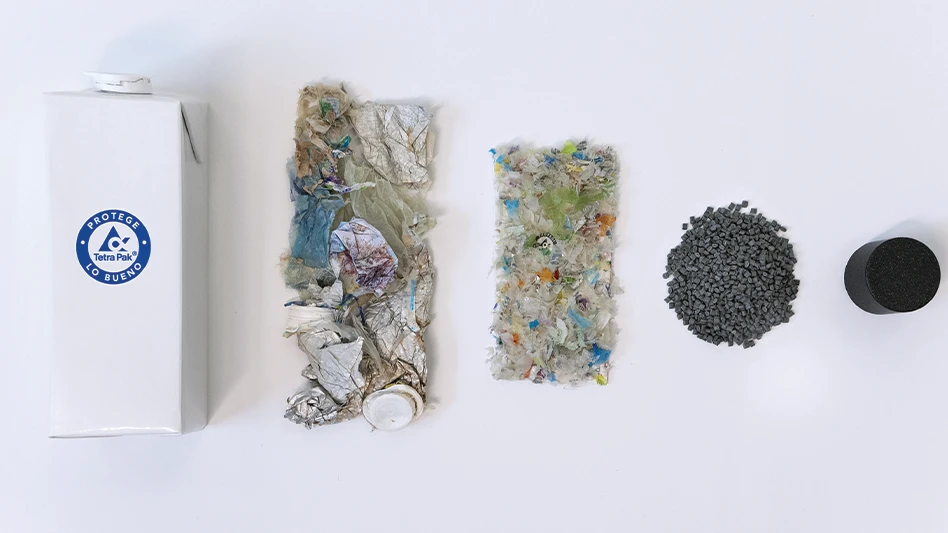
Image courtesy of Tetra Pak
Lausanne, Switzerland-based packaging developer Tetra Pak has announced several strategic investments designed to level up the recycling capacity for carton packages in the European Union.
The company says the move supports the goals of the proposed EU Packaging and Packaging Waste Regulation (PPWR) by ensuring all packaging components are recycled and valuable raw materials are kept in circulation for longer, therefore showcasing the pivotal role of recycling in the green transition of the food packaging sector.
RELATED: Stora Enso, Tetra Pak invest in beverage carton recycling line | Tetra Pak joins ISRI's PSI chapter
In 2023, Tetra Pak invested nearly 40 million euros ($42.9 million) to accelerate beverage carton recycling worldwide, and says it plans to increase this even further in the coming years to achieve a greater material circularity. The recent initiatives and investments are set to boost the EU’s ability to recycle beverage cartons, including the non-fiber protective layers of polyethylene (PE) and aluminum, known as “polyAl.” The company says this will be achieved either by unlocking new collaborations or by strengthening the capabilities of established recyclers to turn all materials from postconsumer cartons into new, high-quality resources and goods.
These add to the existing and well-established recycling infrastructure in the EU, where beverage cartons are recycled in 20 specialized paper mills, with polyAl currently processed by seven facilities.
Tetra Pak’s major 2023 investments include:
- A feasibility study in Sweden along with Axjo Group to build a new recycling line for polyAl that will accommodate volumes from Sweden, Denmark and Norway, fostered by a joint investment of up to 24 million euros ($25.7 million) and featuring an annual recycling capacity of 10,000 tons. The facility will recycle and incorporate polyAl into injection molded plastic products made by Axjo, including cable drums, reels, spools and plastic storage boxes.
- In Spain, Tetra Pak and Trans Sabater have coinvested over 2 million euros ($2.1 million) and expanded their agreement to increase installed polyAl recycling capacity from 3,000 tons to 10,000 tons per year. This valuable secondary raw material has unique thermal properties for increased productivity in plastic transformation processes and is exempt from the plastic tax, as it is 100 percent-recycled material of postconsumer origin. In addition, Trans Sabater’s patented mechanical recycling technology improves the quality of the pellets compared to traditional processes. Potential end markets for recycled polyAl include logistics, packaging, retail and gardening.
- Also in Spain, Tetra Pak and Alier have worked together to consolidate Alier as one of the largest postconsumer carton recyclers in Europe, according to Tetra Pak, and will help that company to become an integrated player able to process all materials from used beverage cartons. Using mechanical recycling, the polyAl will be transformed into high-quality pellets suitable for a variety of end markets. The companies’ goal is to recycle over 15,000 tons of polyAl per year by 2025.
- In the Netherlands, Tetra Pak has invested 1 million euros ($1.1 million) in Recon Polymers’ polyAl recycling plant in a bid to increase the capacity to at least 8,000 tons per year. The company says it will not only improve the efficiency of the process but specifically advance material circularity across France, Belgium and the Netherlands. Tetra Pak says the material’s versatility means it can be transformed into a range of everyday items including reusable pallets, interiors and large-format 3D printed objects.
“For us, this goes beyond industry investment. It’s part of the transformation towards a circular economy and an investment in the future of the planet,” Tetra Pak President of Sustainability Operations Markus Pfanner says. “These innovative collaborations, at the intersection of human ingenuity, technology and finance, demonstrate the value of beverage cartons within sustainable food systems.
“Beverage cartons are recyclable. They are recycled wherever the necessary collection, sorting and recycling infrastructure is in place, at scale, so, naturally, expanding this infrastructure is a priority for us. Projects such as these ensure that consumers can continue to safely access food, and that once they have done so, those cartons can be recycled, keeping quality resources in the loop and reducing the use of virgin content.”
Latest from Recycling Today
- Connect Work Tools names new service manager
- Aaron Industries expands color capability
- Massachusetts voters support modernizing state Bottle Bill
- Oceana Canada poll shows support for single-use plastics ban
- Enviri releases annual ESG report
- Umicore sees lower revenues across all business groups for first half of year
- NEO Battery Materials, Lotus Energy Recycling to partner
- Partnership aims to convert industrial plastic scrap to synthetic graphene





